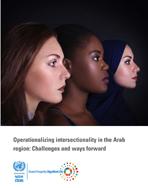The present paper focuses on intersectionality as an analytical approach and calls for a multidimensional understanding of gender in the Arab region, positing that this produces a more accurate understanding of the inequalities that Arab States must address. It argues that governmental and non-governmental actors in the Arab region need to become more aware of and sensitive to divisions within society, in order to construct interventions that take into account power relations and social and economic differentials and that achieve maximum effectiveness and reach.
The paper introduces the concept of intersectionality and provides a rationale for its relevance to the region. It then explores how this concept can be mobilized for promoting and accelerating development for all. For this it identifies four guiding principles that can lead to the development of sound policies to achieve gender equality in the region: (1) The structural nature of inequality: to have an in-depth understanding of the structures that produce different identities; (2) Unpacking categorical thinking: to move away from pre-defined rigid categories that lead to excluding various groups and individuals and strategically use categories to achieve inclusion; (3) Contextualizing and historicizing inequalities: to have and in-depth understanding of the context of the existing inequalities and their history; and (4) Building solidarity/cooperation: to build solidarities among defenders of various rights and around groups suffering discrimination to achieve the rights for all. The identification of these four guiding principles constitutes an important step towards operationalizing the concept of intersectionality and moving it from the academic sphere to the development field, with a particular focus on the Arab region.






